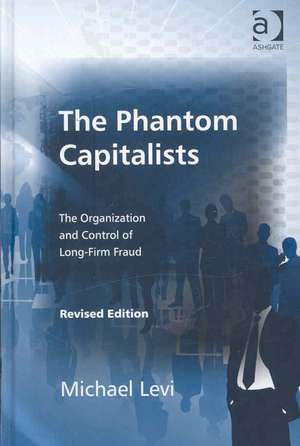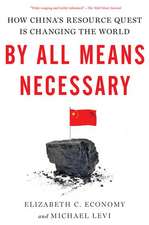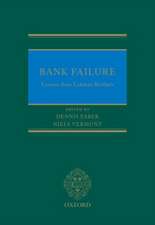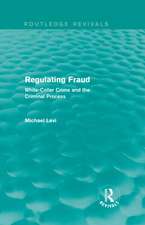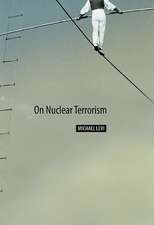The Phantom Capitalists: The Organization and Control of Long-Firm Fraud
Autor Michael Levien Limba Engleză Hardback – 28 mar 2008
| Toate formatele și edițiile | Preț | Express |
|---|---|---|
| Paperback (1) | 396.40 lei 6-8 săpt. | |
| Taylor & Francis – 30 iun 2020 | 396.40 lei 6-8 săpt. | |
| Hardback (1) | 1054.71 lei 6-8 săpt. | |
| Taylor & Francis – 28 mar 2008 | 1054.71 lei 6-8 săpt. |
Preț: 1054.71 lei
Preț vechi: 1286.24 lei
-18% Nou
Puncte Express: 1582
Preț estimativ în valută:
201.81€ • 210.71$ • 167.03£
201.81€ • 210.71$ • 167.03£
Carte tipărită la comandă
Livrare economică 04-18 aprilie
Preluare comenzi: 021 569.72.76
Specificații
ISBN-13: 9780754645160
ISBN-10: 0754645169
Pagini: 440
Dimensiuni: 156 x 234 x 25 mm
Greutate: 0.45 kg
Ediția:Revised edition
Editura: Taylor & Francis
Colecția Routledge
Locul publicării:Oxford, United Kingdom
ISBN-10: 0754645169
Pagini: 440
Dimensiuni: 156 x 234 x 25 mm
Greutate: 0.45 kg
Ediția:Revised edition
Editura: Taylor & Francis
Colecția Routledge
Locul publicării:Oxford, United Kingdom
Cuprins
Contents: Preface; An introduction and postscript to the second edition of The Phantom Capitalists; Introduction; History of long-firm fraud in England until the Second World War; Craft of the long-firm fraudster; Social and criminal organization of long-firm fraud; Motivations and criminal careers of long-firm fraudsters; Informal control of long-firm fraud; Long-firm fraud and the criminal law; Policing of long-firm fraud; Prosecution and trial of long-firm fraudsters; Sentencing of long-firm fraudsters; Towards a theory of long-firm fraud; Control of long-firm fraud: some issues for the future; Appendix A: methodology of this study; Appendix B: predicting those factors which may influence the sentencing of long-firm fraudsters; References; Index.
Notă biografică
Dr. Michael Levi has degrees from Oxford, Cambridge, Southampton and Cardiff universities and has been Professor of Criminology at Cardiff University since 1991. He has been conducting international research on the control of white-collar and organised crime, corruption and money laundering since 1972, and has published widely on these subjects as well as editing major journals, including Criminology and Criminal Justice, the official journal of the British Society of Criminology. His academic standing was acknowledged by the award of a D.Sc. (Econ.) from Cardiff University (2007) and election to a Fellowship of the Association for Learned Societies in Social Sciences (2006). In 2007, he was awarded a 3-year Professorial Fellowship by the UK Economic and Social Research Council to develop research on transnational economic and organised crime and on responses to it. Recent public roles include membership of the UK Cabinet Office PIU steering group on proceeds of crime; European Commission sub-group on money-laundering; Scientific Expert on Organised Crime to the Council of Europe; and Parliamentary Specialist Adviser to a review of policing and anti-social behaviour in Wales. Since 2005, he has examined fraud sentencing for the UK Government Fraud Review and has conducted reviews of (a) economic crime in Europe for the Council of Europe, (b) money-laundering typologies for the ASEM countries, (c) the nature, extent and cost of fraud in the UK for the Home Office and the Association of Chief Police Officers, and (d) enhanced proceeds of crime recovery possibilities for the PM's Strategy Unit. Other recent projects include Evaluating the effectiveness of the Dedicated Cheque and Plastic Crime Unit (Home Office), Measuring and Reducing Crime - a project to integrate organised crime risk analysis into EC policy-making (EC), Improving Knowledge on Organised Crime (EC), Controlling the international money trail (ESRC), Analysis of British Crime Survey data on fraud and hi-tech crime (Home Office), and a Literature review of upper-level drugs trafficking (Home Office) Recent publications include: 2007
Recenzii
'This book was one of a handful in its era (Peter Reuter's Disorganized Crime is the other that comes immediately to mind) that changed the way investigators of crime and its discontents looked at the world and at their subject. It remains vital today, particularly with the additional material which situates it neatly in a more current context. Dealing with what back when it was written seemed at first glance an investigation of a minor (except to victims) and rather colourless crime, namely fraudulent bankruptcy, in reality this book challenged the usual logic applied to investigations of economically motivated crimes, and set a new standard in what - with only a hint of irony - might be called evidence-based (as distinct from random anecdotally based) crime studies.' Thomas Naylor, McGill University, Canada 'This is one of the few books to focus on what fraudsters say and think themselves. This understanding of professional fraudsters "from inside" not only provides a fascinating insight into their lives, it also sheds a penetrating light on the historical background and contemporary surrounding landscape.' Petrus C. van Duyne, Universiteit van Tilburg, The Nedtherlands 'A second edition after more than 20 years is a rare exception in our field. Michael Levi's The Phantom Capitalists is as fresh as it was in 1981. His naturalistic approach and virtuoso account of the world of fraudsters is cutting-edge today - an anticipatory tale of globalisation and crime, without even using the term. Susanne Karstedt, Keele University, UK '...[this books] re-issue is welcome amidst the contemporary torrent of criminological publishing - for the very fact of it being available to a new audience, as well as for it to be re-read in the light of what we think we know about how the world has changed since its first appearance...a classic British criminological text.' British Journal of Criminology 'Despite the now all too obvious relevance for our times and for the continuin
Descriere
This book analyzes how and why people become involved in long-firm (planned bankruptcy) fraud, the links between long-firm fraud and other crimes, the links between bankruptcy fraudsters and other professional and organized criminals, the techniques that fraudsters use, and the social and commercial relationships that exist within the operational world of the long-firm fraudster.
